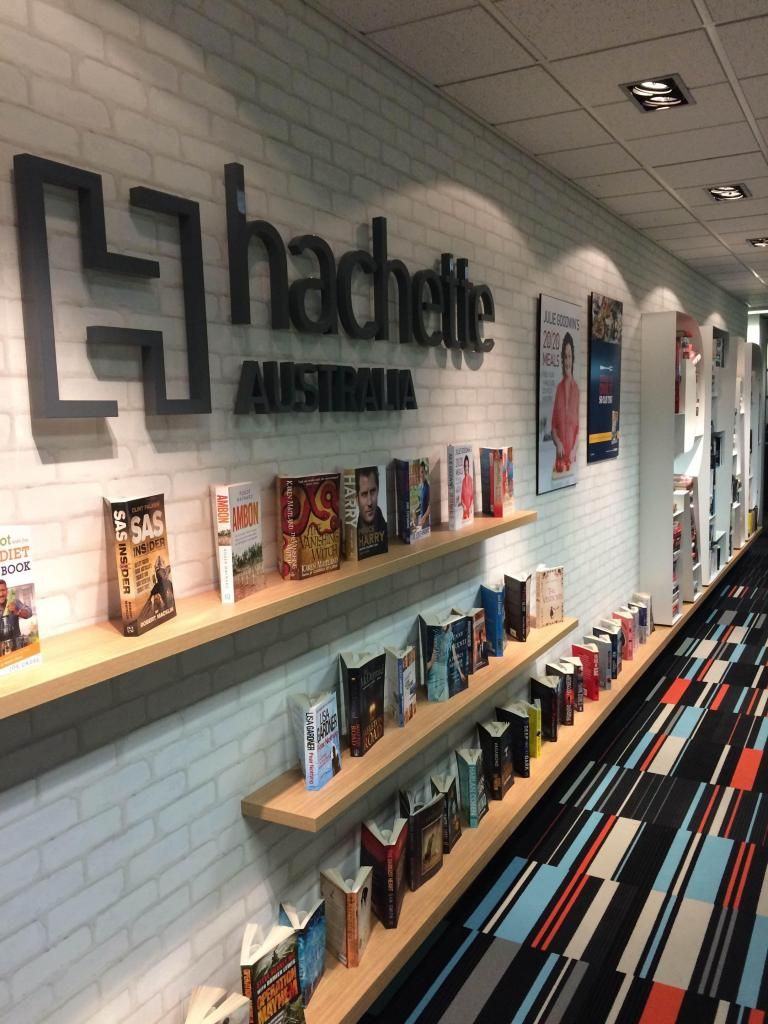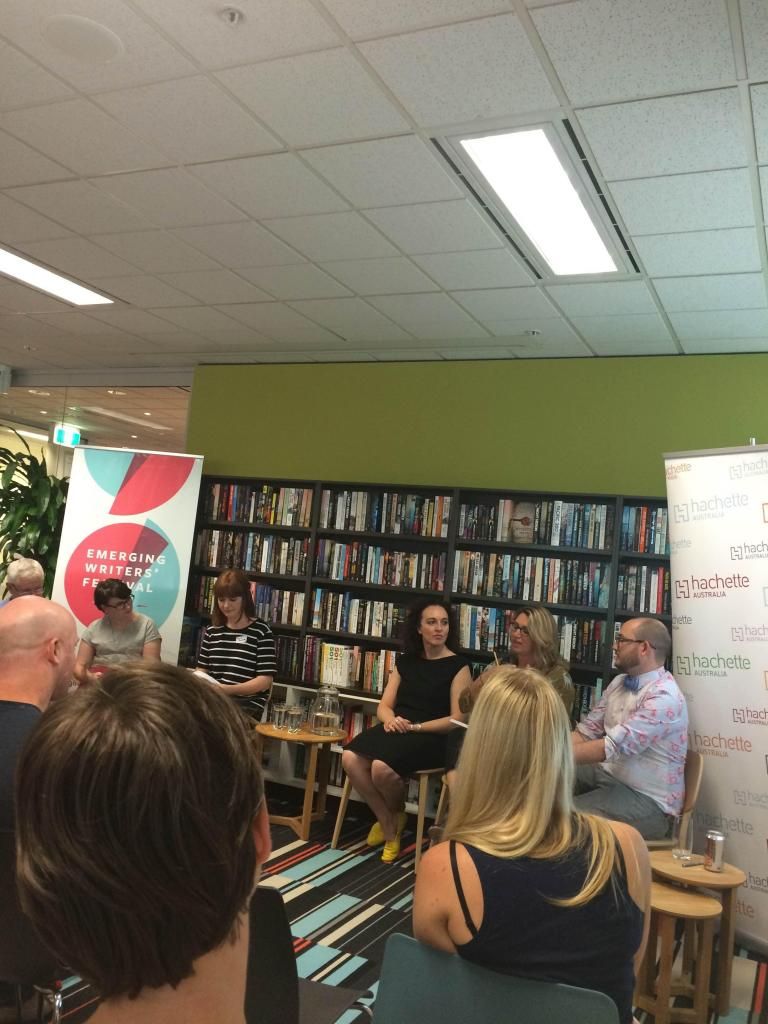This is a Building Blocs post from Lachlan Mackenzie.
So you’ve finished your manuscript, and you’re pretending to be bright-eyed and bushy-tailed - you’re doing a great job of convincing everyone you still have a grip on reality. Now you have to face the mysterious, mythical beast that is the publishing industry.
The ins and outs of the publishing process are often unknown to aspiring writers. Publishers are the fairy godmothers who sprinkle the magic dust that turns your Word documents into pages in a book that people want to buy. Or at least that’s what I thought they were until I went along to the Hachette Australia office for Inside the Publishing House, part of the Emerging Writers’ Festival Roadshow.

Image source: Lachlan Mackenzie
A publisher is a different kind of beast than a literary agent, a publisher will only take your manuscript on if they know they will be able to sell it to readers, whereas an agent will help you sell to publishers. Publishers are editors, proof-readers and marketers. They also handle cover design, type-setting, printing and distribution, and will be the people talking to booksellers and explaining why a book is worth their while. They’ll also be the people sending out review copies of your work to publications for extra advertising.
As it turns out, publishers are people, not fairies (crazy, right?), and their magic is a mixture of editing, marketing and a whole lot of juggling.
Do you need a publisher?
A publisher looks at your work in functional terms. They’ll be asking how well it tells a story, how that story will sell and how it will connect with readers. They’re the business end of the writing industry, and they’re mainly concerned with how your writing is consumed as a product. During the talk at Hachette, non-fiction editor, Sophie Hamley, said, “The frustrations writers feel is because they don’t know what readers want to read.” It’s the job of the publisher to mitigate that frustration, and to help great books get the attention they deserve.
There are jobs involved in the publishing process that seem like the kind of work you could take on yourself, and indeed the past few years have seen an increase in self-publishing, particularly in the e-book marketplace. However, a lot of these jobs are particularly time-consuming, and you have to keep in mind that you’ll be approaching them from an amateur position. You only have one chance to publish your book, and you want to get it right. This isn’t to say that self-publishing isn’t viable, because it is, provided you have the time and knowledge base to do an above-average job of it, separating yourself from the sometimes overwhelming amount of background noise.
Publishers can also provide you with an avenue to connect with booksellers. If someone in a bookshop knows your work, and is able to recommend it, you will move more copies. The staff at Hachette spoke at length about Brooke Davis’ novel Lost and Found. Prior to the launch of the book they sent out advanced copies to bookstores around the country, and Brooke Davis herself attended many in-store events. Anna Egelstaff, publicity manager at Hachette said, “When a bookshop gets to know an author they can sell that book. They can relate and believe in it.” People buy books based on recommendations and word of mouth, and booksellers can be your best ally.
How can you stand out to a publisher?
You need to have a hook that will set your work apart. Robert Watkins, Publisher at Hachette said, “If I can’t sell your story in one sentence, the book isn’t going to get beyond the acquisitions meeting.” An acquisitions meeting at Hachette involves the team sitting down after reading a manuscript and brainstorming the work’s strengths and weaknesses. Here, they examine both you and your work, and something needs to jump out.
The staff at Hachette stressed that emerging authors need to put a lot of effort into selling themselves and their books. They will look to an author’s social media footprint, whether they are engaged in online writing communities such as Wattpad and tablo, and if they’ve got an audience on Twitter, Facebook, LinkedIn (jokes, not LinkedIn). As an emerging writer you have to do a lot of the marketing yourself, because publishing houses have limited resources, particularly for smaller authors who are not yet established. Having these audience bases becomes an asset when you’re looking to publish for the first time, and bringing an audience to the table at an acquisitions meeting can be the deciding factor that makes you profitable.
For better or worse, the staff at Hachette stressed that in both fiction and non-fiction the author is a big selling point. People want to read extraordinary stories and they tend to care more if the story is being told by someone they view as extraordinary too. That said, the most important thing is your manuscript. By the time you’re submitting to a publisher it should be as good as you can make it. It’s an unfortunate truth that a publisher doesn’t have time to help completely rework your ideas, and if your book doesn’t show clear promise, the publisher can’t help. So when you’re submitting, make sure you’ve taken care of the basics - no plot holes, learn to punctuate, spell, structure, all that jazz.

Image source: Lachlan Mackenzie
Writing with publishing in mind
You need to remember that a time-poor publisher reading your work for the first time, from a pile of books that could be incredibly similar, needs to be engaged from the first page. The best openings will know their audience, and will engage with them specifically. They’ll show the publisher that you have an understanding of who will be buying your book, and that you know how to appeal to them. An author that is mindful of their audience is a publisher’s dream.. During the talk at Hachette Sophie Hamley encouraged writers to think about how telling their story to 25 million people would change it, and this is the kind of question you need to be asking yourself before publishing. Ask who your writing is for, and why would they want it.
It’s also useful to look at publishers the same way you do a literary journal or website you might want to write for. Publishers follow zeitgeists, and try to track where the interests of the reading majority are headed. They also have their own style and certain kinds of books they publish. If you’re not the kind of author they like it doesn’t mean you’re a bad one, it just may mean you need to try a different house. Hamley said, “It’s important for the publisher to feel their taste is being acknowledged.” In the same way you account for the reader, you need to account for a publishing house too.
Finally, have an open mind about your work. There aren’t absolutes between your work being pure and artistic, and it being corrupted by commercial influence. A publisher isn’t a demon-baby that wants to eat your words and spit out money. Publishers are people who work in a business-minded setting but often come from a book-loving background. Plus they’re being paid less than they deserve just like everyone else in the artistic community. Obviously not everyone is perfect and there are negative corporate influences out there as everyone struggles with the behemoth that is Amazon, but generally people don’t get into the publishing industry just to make money.
If you’re lucky enough to be accepted by a publisher you’ll be entering into a creative partnership with them. One where your ideas and theirs can come together to make your writing into something more. If a publisher is treating you more like a commercial than a creative partner then it’s likely that you should be looking elsewhere. Still, it’s important to remember that for a publisher, each book by an emerging writer is a gamble, so they also desperately want you to succeed. Leaving it on a positive note, the staff at Hachette were very enthusiastic about Australian writing, and the company is reaching out with various partnerships to help emerging writers get attention. On the day Sophie Hamley said, “The only way we’ll get great Australian books is by having writers believe that the audience is out there.”
So as cliché as it is: just believe, and keep writing.
Lachlan Mackenzie is an editor and writer who has written for Junkee and is a contributor and ex-editor of Vertigo Magazine. He subsists on a diet of pop culture and indoor lighting and tweets sweet nothings to no one in particular @lurkenmackenzie.
Writers Bloc Community
The Writers Bloc is a community for writers. We provide free anonymous workshopping, advice, events, opportunities, and a paid publishing platform.

